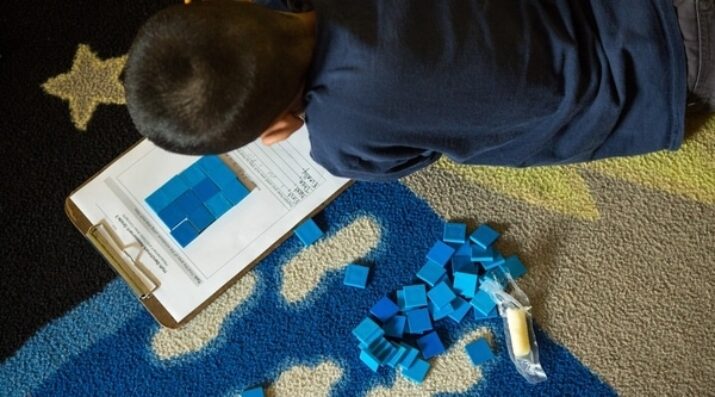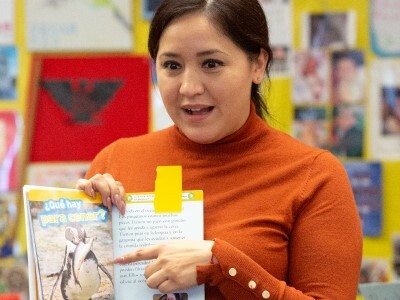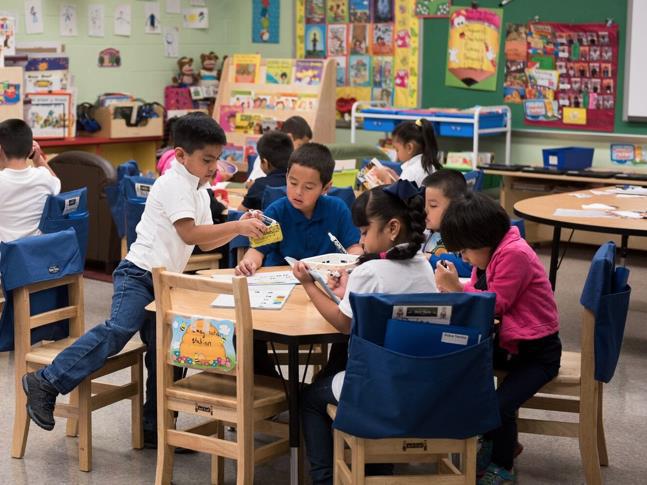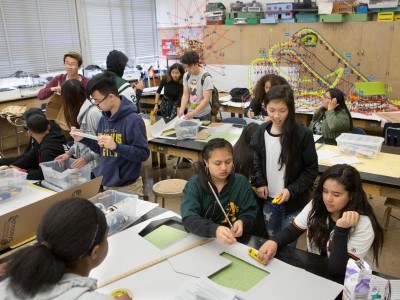Supporting Our Learning Communities in a Time of Crisis
Topics

When educators design and create new schools, and live next gen learning themselves, they take the lead in growing next gen learning across the nation. Other educators don’t simply follow and adopt; next gen learning depends on personal and community agency—the will to own the change, fueled by the desire to learn from and with others. Networks and policy play important roles in enabling grassroots approaches to change.
Practitioner's Guide to Next Gen Learning
Special Edition: Supporting educators, schools, and learners with resources for next gen teaching and learning in remote and virtual settings, with a crowd-sourced resource hub.
In response to widespread school closures due to the outbreak of COVID-19, this edition of Friday Focus: Practitioner’s Guide to Next Gen Learning is dedicated to supporting educators, schools, and learners with resources for next gen teaching and learning in remote and virtual settings.
Below you will find an annotated list of links to high-quality tools and materials from partner organizations and other trusted sources, organized by theme. In addition, we are also facilitating this crowd-sourced resource hub, which can be continuously updated as new tools, resources, and opportunities come to our attention. We invite you to access the existing resources in the hub. However, we also urge you to share new ones as you find or develop them. We are particularly interested in authentic materials you—as next gen learning practitioners—are creating for use with your own students.
Think of this enterprise as a virtual barn-raising. Working together as a professional community, we can rise to the challenges before us and support each other so that we may support our learners and their families.
Communicating with Students, Parents, and the Community
“A Digital-First, COVID-19 Remote Learning Plan.” Five steps to help school leaders and stakeholders co-create a community-engaged remote learning plan that is flexible, collaborative, and transparent. (BUOY Consultants)
“Talking to Children About COVID-19 (Coronavirus): A Parent Resource.” Guidelines and age-appropriate talking points for discussing COVID-19 with children. (National Association of School Psychologists and National Association of School Nurses)
Supporting Next Gen Learning Practices in a Remote Environment
“Designing Deeper Learning for Online Distance Learning During Social Distancing.” A brand-new online course for educators via the InspirEd platform (register for free), offering the basics for distance learning during the COVID-19 outbreak: meaningful Deeper Learning online, inclusion, equity, and access for distance learning, as well as tech and online engagement tips. (2Revolutions)
“School Closures? Using PBL in Remote Learning.” Guidance and resources to support PBL teachers to connect and engage students in remote learning that is as powerful as in their face-to-face classrooms. (PBL Works)
“Remember, Online Learning Isn't the Only Way to Learn Remotely.” The author reminds educators that, although students may not learn all the content that we had planned for, that loss can be balanced by tremendous benefits, such as gaining essential skills and mental health benefits, via assignments that invite students to engage in regular practice, creation, or connection. (Kate Ehrenfeld Gardoqui, EducationWeek)
“Coronavirus Unit.” An extended lesson plan designed to encourage students to capture this moment in history, honoring student choice, agency, and voice, so that students create their own record of this moment in time. For 12th graders, but easily adaptable to other grade levels. (Kelly Gallagher)
Ensuring Equitable Learning Opportunities and Access
“COVID-19 and Students with Disabilities.” Strategies, requirements, and guidance for school leaders about serving students with disabilities. (National Center for Special Education in Charter Schools)
“Inclusion, Equity, and Access While Teaching Remotely.” Article that describes specific DEI issues and offers many tips for increasing equity and access when teaching remotely. Written for a higher-ed audience, but relevant for K-12 teachers who are tasked with teaching online. (Rice University Center for Teaching Excellence)
“Coronavirus and Racial + Social Equity: Centering Justice During Times of Uncertainty and Four Things You Can Do Right Now.” Building on the belief that the work of equity requires us to slow down in the midst of challenges and crises, this article shares recommendations on how we can take the most equitable approach moving forward “in community.” (The Justice Collective)
Attending to Social-Emotional Needs of Students, Staff, and Families
“Parent/Caregiver Guide to Helping Families Cope With the Coronavirus Disease 2019 (COVID-19).” Information and guidance for parents about planning for, communicating about, and coping with the stress of the COVID-19 outbreak. (The National Child Traumatic Stress Network)
“Managing Anxiety Around COVID-19: Tips for You and Your School.” Ideas for managing feelings of anxiety by starting with yourself so that you are calm enough to validate, reassure, and support others. (The Yale Center for Emotional Intelligence)
“ASSET At-home Toolkit.” Five concrete stress-reducing tools for parents to practice with their children. (ASSET Education)
Delivering Your Learning Experiences
“Guide to Starting With Distance Learning.” A collection of tips, resources, and recommendations from our instructional coaches for facilitating effective virtual learning, including planning for equity, culture, communications, student engagement, and assessment. (BetterLesson)
“School Closure Resource Hub.” Essential guides and resources for remote teaching and learning, including district and admin planning, online teaching pedagogy, selected tools and content resources, and student and family well-being. (Transcend)
“The ‘Best of the Best’ Resources to Support Teachers Dealing with School Closures.” A curated list of links to tips, tools, tutorials, and other resources to support online learning, including converting videos into interactive learning, using zoom for collaborative group learning, and remote learning ideas for younger students. (Larry Ferlazzo)
“Amazing Educational Resources.” A crowd-sourced and continuously updated list of companies offering free subscriptions to their platforms and/or content banks. (via LIFTed Facebook Group)
“Approaches to Instruction During School Closure.” High-quality practices and resources that public charter school networks and school districts are using as they navigate these murky educational waters. (Julie Kennedy, Charter School Growth Fund)
Accessing Free Content and Instructional Materials
Free sources recommended by our network:
CommonLit. A collection of fiction and nonfiction for 3rd-12th grade readers. Filter by lexile, grade, theme, genre, literary device, or common core standard.
Khan Academy. Self-directed learning modules with text and videos in Math, Science, Computing, Arts & Humanities. See also these newly added sample daily schedules by grade level.
Zearn. Four hundred hours of digital math lessons for K-5, now available for free, as well as paper-based materials that can be used without a device.
Duolingo. Self-directed, game-like language learning for computer or mobile device. Choose from over 30 world languages to learn.
Newsela. Offering complimentary access to standards-aligned texts through the 2019/2020 school year in ELA, Social Studies, and Science, as well as the Newsela SEL Collection.
Wink (SMALLab). A “free for the duration” learning platform providing thousands of standards-aligned activities accessible by computer or tablet. Students can launch learning activities from home, and teachers can monitor their work with Wink’s data dashboard.
Be well and take care of yourselves and each other. Best,
Amanda and the NGLC Team
Photo at top courtesy of Allison Shelley/The Verbatim Agency for American Education: Images of Teachers and Students in Action




